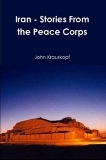Review of John Krauskopf’s (Iran 1965-67) Iran-Stories from the Peace Corps
 Iran – Stories from the Peace Corps
Iran – Stories from the Peace Corps
by John Krauskopf (Iran 1965-67)
Lulu Publisher, $20.00
296 pages
2013
Reviewed by Deidre Swesnik (Mali 1996-98)
•
“Terry O’Donnell was an elfin man, small of stature, who walked with a limp. An adventurer and a romantic, he had found in Iran the perfect venue for his romanticism.”
So begins one of the more compelling stories in Iran – Stories from the Peace Corps by John Krauskopf. Krauskopf seems at his best when he is describing a character or recouting a particular moment in time. There are a number of great stories in this book that do one or the other.
“In Some Ways We Are Not So Different” is the story of Terry O’Donnell, the elfin man who is himself telling a story. He tells the story of an American who is bombastically critical of Iranian culture, when he clearly doesn’t really know much about it. O’Donnell, over an evening, manages to show the insulting man just how wrong he is.
In “The Gods Send Sisyphus to Khuzistan,” we meet Mr. Tohidi who “had a round face and a receding hairline with the remaining hair neatly at attention in a crew cut. He always wore dark suits as befit an educator of his rank, even on the hottest days in the desert climate of Khuzistan.” This story gives us insight into Krauskopf’s personal impressions and experiences as a Peace Corps Volunteer; at the same time, we see his empathy with the complex person of Mr. Tohidi. Just like any volunteer worth his salt, Krauskopf overcomes his outsider’s view of what seems initially to be cultural oddities, and reaches a deeper understanding of what may be driving Mr. Tohidi’s actions.
One of the stories that describes a particular moment in time – like the ones that you regale your kids with at dinner or that you remember over a beer with friends – is “Tea with Ice.” As we learn in the story and throughout the book, tea is a key ingredient in any Iranian day – after meals, between friends, or just whenever. But even in the scorching heat, there’s only hot tea. No exceptions. Try to describe “iced tea” to an Iranian waiter and you’ll get a quizzical stare at best. Many volunteers have tried it, but none has succeeded. One day, two volunteers can’t bear the heat and anymore and are willing to try just one last time.
As the author emphasizes, he did not serve in the Iran of today. The 1960s were a lot different in Iran, not to mention in the Peace Corps. At the very beginning of the book in “Looking for Love, I Discovered the Peace Corps,” we learn that Krauskopf was at the University of Michigan “in the middle of a chilly October night in 1960” when JFK make his first speech about the Peace Corps. We learn about some of the crazy politics in Congress at the time around the Peace Corps, like concerns about communism. And the author tells us all about his training in the story “Tequila and Temblors,” including a night out in Mexico, a debate about socialism versus capitalism, and cheating the amateurish psychiatric evaluations administered to the volunteers.
Yet, some of the book’s stories will be familiar to any Peace Corps Volunteer. In “Touching a Culture,” the author describes a time, for example, when he realized he almost had two different personalities, one Iranian and one American. He has become so used to Iran’s cultural cues that he took them when he was speaking in Farsi, and then switched back to typical American interaction when he was speaking in English. He didn’t even notice that he was doing it – it took someone watching him once to make him see it. It’s like that quintessential Peace Corps moment when you start dreaming in your new language and you know that you have truly arrived.
The production value of the book could use a little facelift. I wish that self-publishing book companies would do better by their clients and make their books look more like authentic ones. This one looks more like a review copy, except for the cover, which is a great color combination of dark and light blues and a photo at dusk, presumably somewhere in Iran.
Grab a coffee or a beer, a copy of the book, and settle in for some storytelling.
•
Deidre Swesnik (Mali 1996-98) laughed for a lot of her two years in Peace Corps Mali and still does so uproariously with her RPCV friends at home in Washington, DC. DeeDee is the Director of Public Policy and Communications at the National Fair Housing Alliance, loves to edit and read, and is terrified of writing anything longer than two pages.
No comments yet.
Add your comment